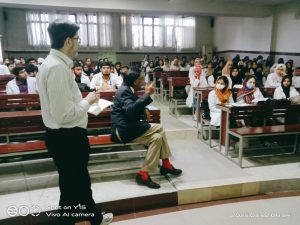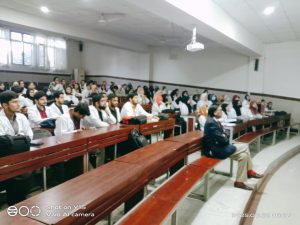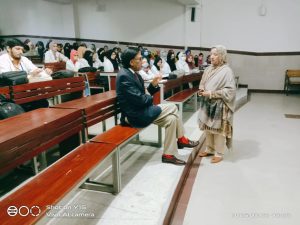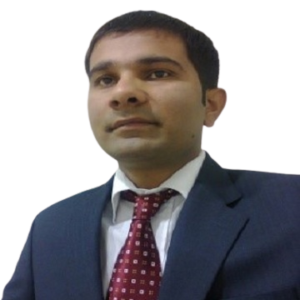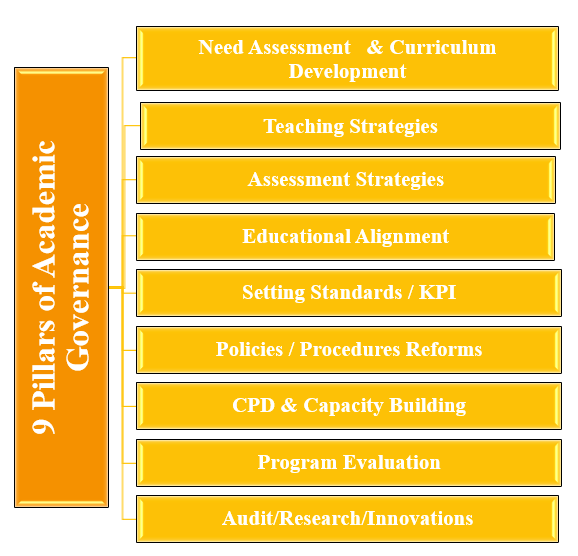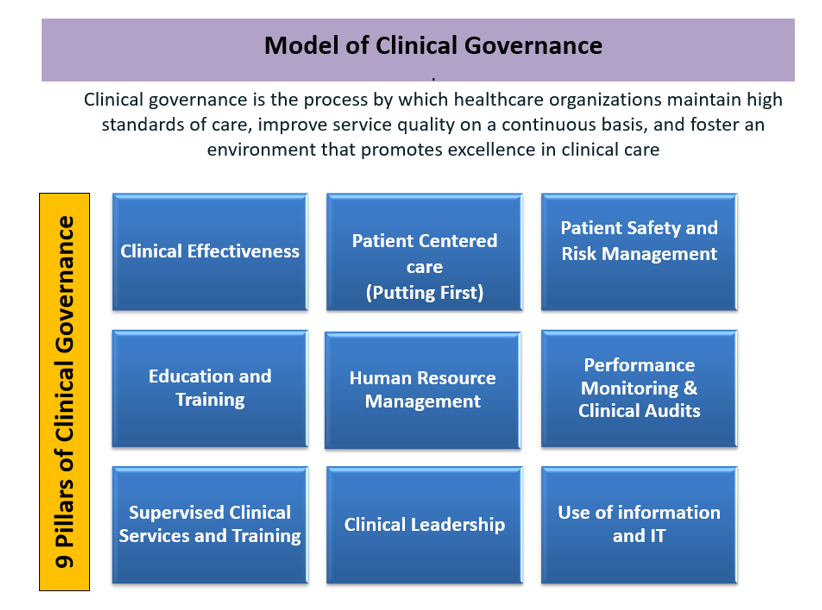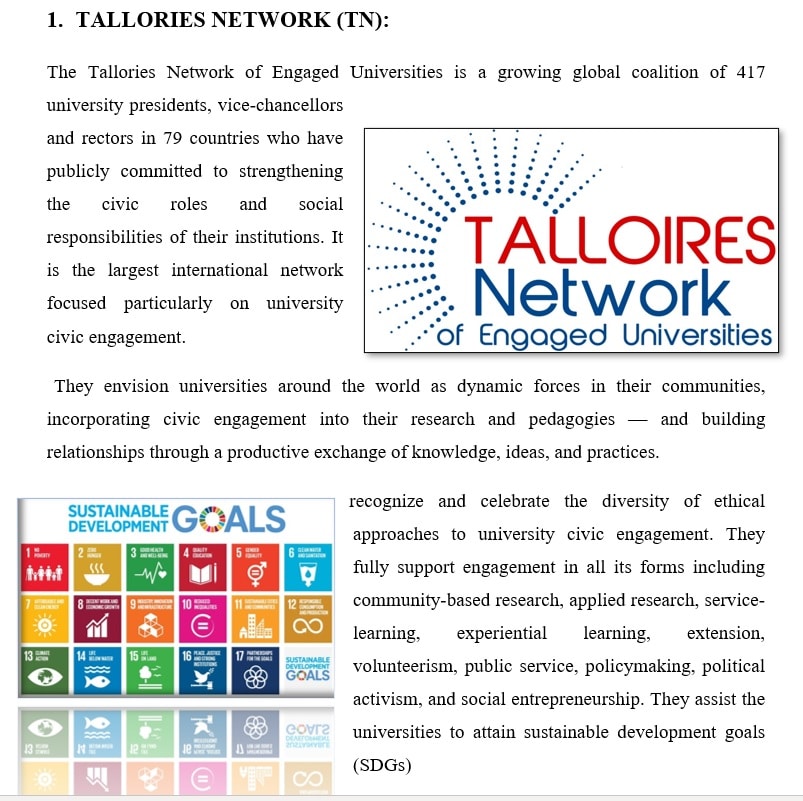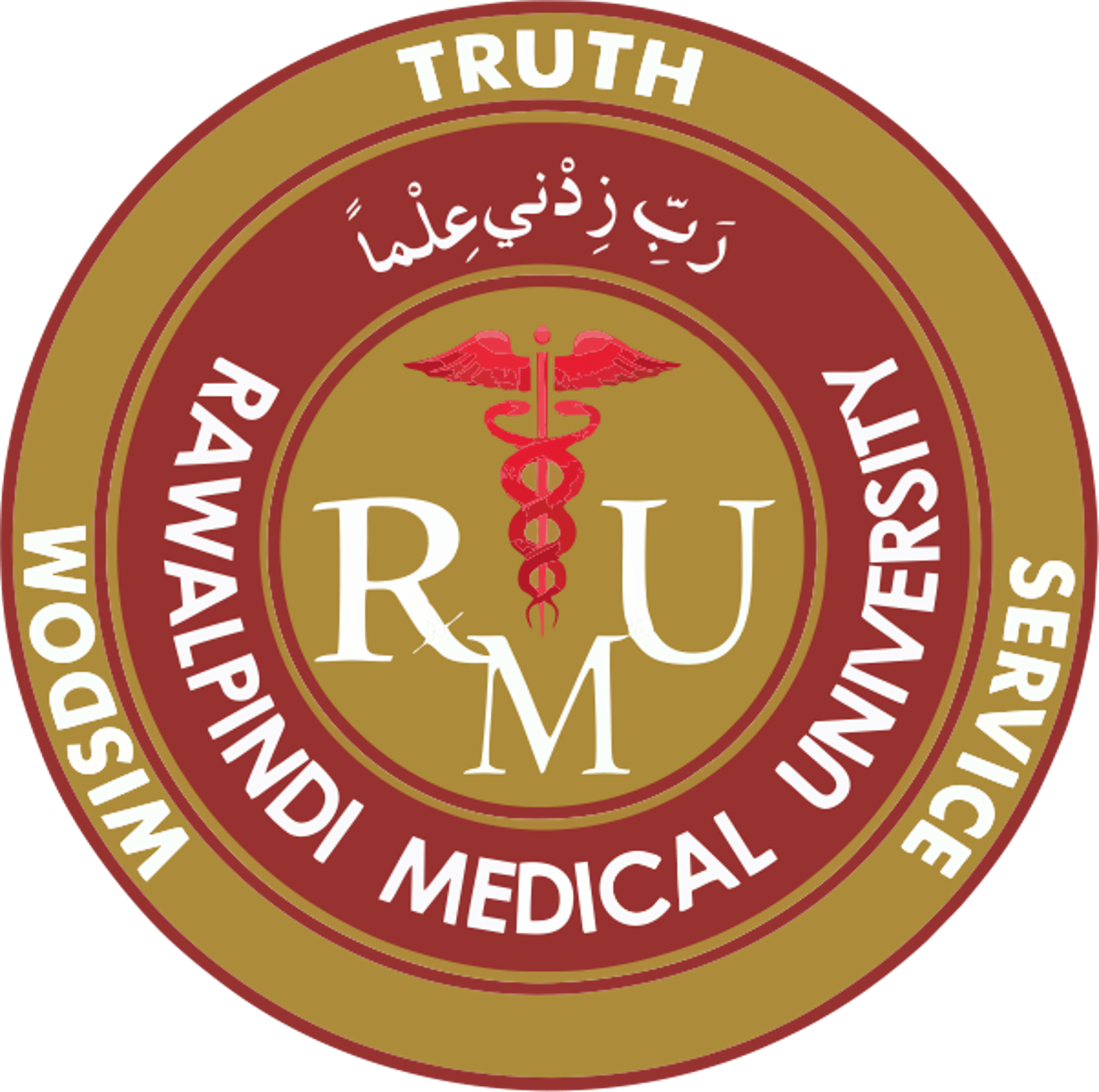Quality Enhancement Cell (QEC)
Welcome To
Quality Enhancement Cell RMU
In recent years it has become an obligation that institutions of higher education demonstrate the effectiveness of their academic programs in providing high quality education that positively impacts students. Furthermore, most accrediting bodies and others concerned with quality assurance are requesting that institutions assess students learning outcomes as a means of improving academic programs. This has led the HEC to develop methods for assessing the quality of academic programs.

Dr Usman Qureshi
Director QECAssessment is a systematic process of gathering, reviewing and using important quantitative and qualitative data and information from multiple and diverse sources about educational programs, for the purpose of improving student learning, and evaluating whether academic and learning standards are being met. The process culminates when assessment results are used to improve students’ learning. The elements of a successful assessment program include:
- Purpose identification
- Outcomes identification
- Measurements and evaluation design
- Data collection
- Analysis and evaluation
- Decision-making regarding actions to be taken
RMU is constantly striving to raise the existing standards of medical undergraduate and post graduate education. As per directions of HEC, Quality enhancement cell (QEC) was established at RMU in July, 2017 by the executive orders. Currently the cell is situated in the building of Department of Medical Education. Since its establishment, QEC has been enthusiastically involved in activities which have greatly helped QEC maintain quality in medical education
The primary mission of the QEC is to systematically enhance the quality of all aspects of our institution’s operations. This involves a strategic focus on:
- Academic Excellence: Ensuring that our programs, curricula, and teaching methodologies are aligned with best practices and evolving industry standards. We aim to foster an environment where academic programs are continually refined to meet the highest educational standards.
- Operational Efficiency: Streamlining administrative processes and systems to improve effectiveness and efficiency. This includes the implementation of best practices in resource management, student services, and institutional support functions.
- Stakeholder Engagement: Actively involving students, faculty, staff, and external partners in the quality assurance process. We seek to create feedback loops and collaborative mechanisms that allow for the continuous gathering and incorporation of diverse perspectives.
- Compliance and Accreditation: Ensuring adherence to regulatory requirements and accreditation standards. The QEC plays a crucial role in preparing for accreditation reviews and maintaining compliance with national and international quality standards.
Our Team
Key Functions & Activities
To fulfill its mission, the QEC engages in a range of functions and activities:
- Quality Audits and Reviews: Regularly conducting comprehensive audits and assessments of academic and administrative processes to identify strengths, weaknesses, and areas for improvement. These audits are instrumental in developing targeted action plans for enhancement.
- Development of Quality Assurance Frameworks: Designing and implementing frameworks and policies that standardize quality practices across the institution. This includes setting measurable quality indicators and performance metrics.
- Training and Capacity Building: Organizing and facilitating professional development programs for faculty and staff to enhance their understanding and application of quality management principles. Workshops, seminars, and training sessions are tailored to address specific needs and emerging trends.
- Feedback Collection and Analysis: Deploying surveys, focus groups, and other tools to collect feedback from students, faculty, and other stakeholders. Analyzing this feedback to identify areas for improvement and inform decision-making.
- Strategic Planning and Implementation: Collaborating with institutional leadership to develop and execute strategic plans that align with the institution’s goals and objectives. This includes setting long-term quality enhancement goals and monitoring progress towards achieving them.
Acheivements & Impact
Over the past year, the QEC has made significant strides in advancing quality across various domains. Notable achievements include the successful implementation of new quality assurance frameworks, enhanced stakeholder engagement practices, and substantial improvements in institutional processes. These accomplishments underscore our commitment to driving positive change and achieving excellence.
Vision and Future Directions
As we look to the future, the QEC is dedicated to embracing emerging trends and challenges in the field of quality enhancement. Our vision is to establish a dynamic and responsive quality management system that not only adapts to the changing educational landscape but also sets a benchmark for excellence. We are committed to fostering an environment of innovation and collaboration, ensuring that our institution remains at the cutting edge of academic and operational quality.
QEC is intended to have excellent quality and standards of:
- Cause evaluation of performance of the university.
- Advise institution in ensuring a proper balance between teaching and research.
- Develop guidelines and facilitate the implementation of a system of evaluation of performance of faculty members and institution.
- Encourage, support and facilitate training programs, workshops and symposia.
- Guide university in designing curricula that provides a proper content of basic sciences and social sciences in the curricula of each level and guide and establish minimum standards for good governance and management.
- Student feedback
- Feedback of program running for undergraduates is collected
- Workshops feedback
- Feedback is collected at the end of each workshop.
- Feedback of annual lectures of university residency program trainees
- Feedback is collected at the end of every lecture.
- CPC feedback
- Feedback is collected at the end of each CPC.
- Data of all the feedback is then entered and analyzed in IBM SPSS version 22
- Then report is compiled and presented to the director DME and then worthy vice chancellor.
- Monitoring of admissions, inductions and examinations.
QEC Tool Box
The Higher Education Commission is making concerted efforts to improve the quality of higher education and to move university education to meet international standards in the provision of high-quality teaching, learning, research and service. Focused and precise approach is being developed for the best results and for consistency in the process of the Quality Assurance & Enhancement in higher education in the country. It reflects an effort to sensitize higher education institutions to the changes taking place internationally and bring higher education in Pakistan into complete harmony with the shifting paradigms at leading institutions around the world. Thus, various long and short run initiatives of the Higher Education Commission are aimed particularly at improvement of the quality of knowledge being imparted at the universities and other higher education institutions.
QEC uses has designed many survey forms to keep a check on the learning and teaching process. These proforma have been approved from the academic council of the university. Tools include
- HEC guidelines………………………………For university
- Performance evaluation report………………For faculty
- 360° evaluation proforma……………………For university residency program trainees
*HEC guidelines are available
Quality Assurance Model
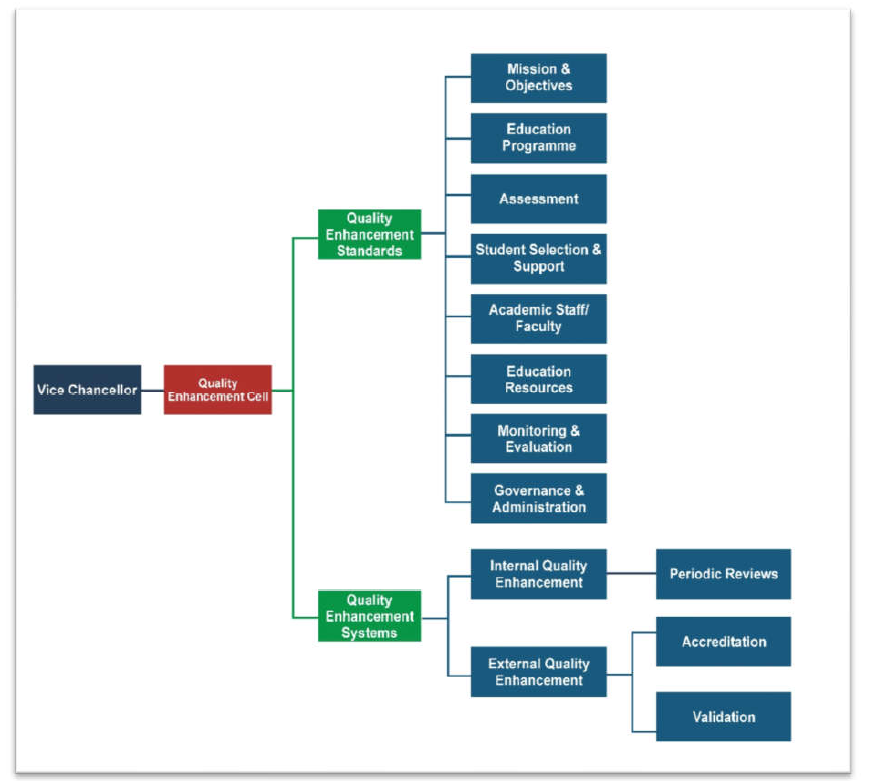
Functional Framework of QEC
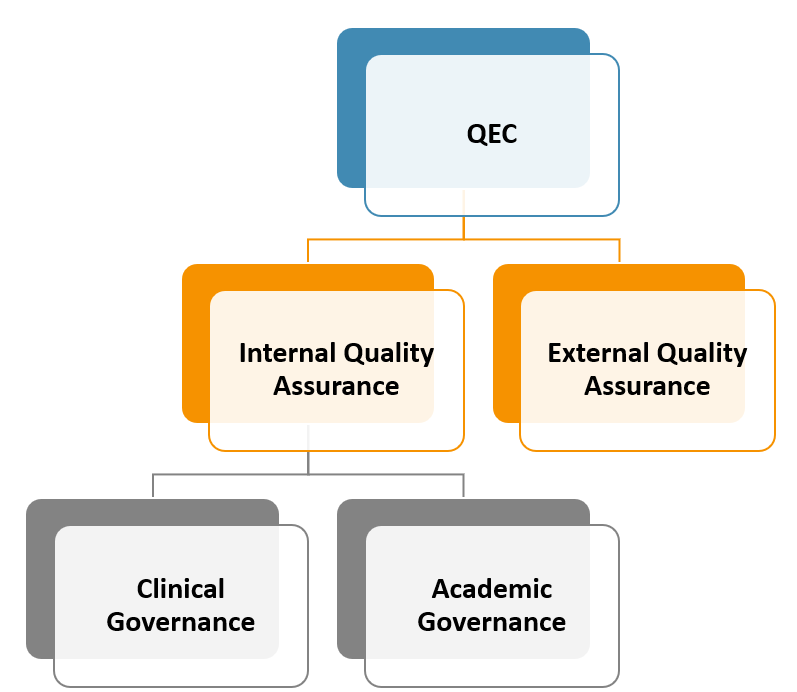
The Quality Enhancement Cell (QEC) operates within a structured framework designed to systematically address and enhance the quality of academic programs, administrative processes, and institutional operations. This framework ensures a comprehensive approach to quality management, integrating various functions and activities to achieve our mission of excellence. Below is an outline of the key components of the QEC’s functional framework:
- Quality Assurance and Improvement
Objective: To develop and implement robust quality assurance mechanisms that drive continuous improvement across all areas of the institution.
- Quality Assurance Framework: Establishing and maintaining a comprehensive framework that includes standards, policies, and procedures for ensuring academic and operational quality.
- Periodic Reviews and Audits: Conducting regular internal and external reviews to evaluate the effectiveness of academic programs, administrative processes, and overall institutional performance.
- Benchmarking: Comparing institutional practices and performance against best practices and standards from similar institutions to identify areas for enhancement.
- Academic Quality Management
Objective: To ensure that academic programs and curricula meet high standards of quality and relevance.
- Curriculum Development and Review: Overseeing the development, evaluation, and periodic revision of curricula to ensure alignment with academic standards and industry needs.
- Faculty Development: Implementing programs for the professional development of faculty, focusing on pedagogical skills, research capabilities, and teaching effectiveness.
- Student Feedback and Assessment: Collecting and analyzing student feedback on courses and faculty and using this data to inform improvements in teaching and learning.
- Operational Efficiency
Objective: To optimize administrative processes and resource management to enhance the overall efficiency of institutional operations.
- Process Optimization: Identifying and implementing best practices for administrative processes, including student services, admissions, and finance.
- Resource Management: Ensuring effective utilization of institutional resources, including human, financial, and physical resources.
- Technology Integration: Leveraging technology to streamline operations, improve data management, and enhance communication within the institution.
- Stakeholder Engagement and Communication
Objective: To actively engage with and solicit feedback from stakeholders to inform quality enhancement efforts.
- Stakeholder Feedback Mechanisms: Developing and managing systems for gathering feedback from students, faculty, staff, alumni, and external partners.
- Communication Strategies: Implementing effective communication strategies to keep stakeholders informed about quality enhancement initiatives, achievements, and developments.
- Collaborative Partnerships: Building and maintaining partnerships with industry, accrediting bodies, and other educational institutions to support quality enhancement efforts.
- Compliance and Accreditation
Objective: To ensure that the institution adheres to regulatory requirements and accreditation standards.
- Regulatory Compliance: Monitoring and ensuring compliance with relevant educational regulations, policies, and legal requirements.
- Accreditation Processes: Preparing for and managing accreditation reviews, including the development of self-assessment reports and coordination with accrediting agencies.
- Continuous Improvement: Using feedback from accreditation reviews and compliance audits to drive ongoing improvements and maintain accreditation standards.
- Data Management and Analysis
Objective: To collect, analyze, and utilize data to drive quality improvement and informed decision-making.
- Data Collection: Implementing systems for the collection of relevant data related to academic performance, operational efficiency, and stakeholder satisfaction.
- Data Analysis: Analyzing data to identify trends, measure performance, and inform strategic decisions.
- Reporting: Preparing and presenting reports on quality metrics, audit results, and improvement initiatives to institutional leadership and stakeholders.
- Strategic Planning and Implementation
Objective: To align quality enhancement efforts with the institution’s strategic goals and objectives.
- Strategic Planning: Collaborating with institutional leadership to develop strategic plans that incorporate quality enhancement goals and initiatives.
- Implementation and Monitoring: Overseeing the implementation of strategic initiatives and monitoring progress towards achieving quality objectives.
- Evaluation and Adjustment: Regularly evaluating the effectiveness of strategic initiatives and adjusting as needed to ensure alignment with institutional goals.
- Training and Development
Objective: To build capacity and enhance the skills of faculty and staff in quality management and related areas.
- Training Programs: Organizing training sessions, workshops, and seminars on quality management, best practices, and professional development.
- Capacity Building: Supporting the development of competencies in quality management and continuous improvement among faculty and staff.
- Knowledge Sharing: Facilitating forums and knowledge-sharing platforms to promote the exchange of best practices and innovative ideas.
The functional framework of the QEC is designed to ensure a holistic and systematic approach to quality enhancement. By focusing on these core areas, the QEC aims to drive continuous improvement and uphold the highest standards of excellence within the institution.
Benefits for Engaged Members include opportunities to:
- Gain public acknowledgement and visibility as an active contributor to the global university civic engagement movement;
- Participate in bi-annual strategic planning meetings to explore opportunities for collaboration including fundraising for new programs
- Apply, without a fee, for the Carnegie Community Engagement Classification International pilot
- Apply for Network faculty professional development programs, which include financial support for civic engagement activities and public recognition for excellence in engaged scholarship
- Apply for Network demonstration grant programs, which involve substantial technical and financial support for innovative university civic engagement programs
- Apply to participate in global learning exchange programs for students, staff, faculty and administrators
- Participate in collaborative writing and research projects, which includes international workshops as well as technical and financial support for publishing reports, articles, and books
- Participate in internationally publicized interviews and webinars
- Organize and lead plenary and breakout sessions at the Talloires Network Global Leaders Conference
- Apply for travel, lodging and registration grants for the Talloires Network Global Leaders Conference
- RMU can benefit from this membership through
- Visibility amongst the international members of the network
- Possibility to join some international civic engagement activity
- Showcasing the civic engagements of RMU Students/Faculty
- Opportunity to compete for MacJannet Prize Award.
- MacJannet Prize (https://talloiresnetwork.tufts.edu/about-the-macjannet-prize/) has been established by TN to recognize exceptional student community engagement initiatives at member universities and contribute financially to their ongoing public service efforts through following categories of programs
- Student volunteer placement programs
- Institution-managed community outreach programs
- Domestic service-learning programs
- International service-learning programs
- Student-managed community engagement
United Nations Academic Impact (UNAI):
RMU has joined over 1400 academic and research institutions from 139 countries who are members of the United Nations Academic Impact (UNAI), a UN platform.
UNAI is a program of the Outreach Division of the United Nations Department of Global Communications. It’s an initiative that aligns institutions of higher education with the United Nations in supporting and contributing to the realization of United Nations goals and mandates, including the promotion and protection of human rights, access to education, sustainability, and conflict resolution.
Since 2010, UNAI has created a vibrant and diverse network of students, academics, scientists, researchers, think tanks, institutions of higher education, continuing education and educational associations. Since its inception some thirty international networks of universities and other institutes of higher education and research have endorsed UNAI and encouraged their members to join, representing a global diversity of regions and a thematic wealth of disciplines.
The work of these institutions is vital to achieving the Sustainable Development Goals (SDGs) as they serve as incubators of new ideas, inventions and solutions to the many global challenges we face. UNAI provides the integral link to these stakeholders to ensure that the international community harnesses the energy and innovation of young people and the research community in service to humanity.
UNAI assists stakeholders in this regard by disseminating information on UN initiatives and activities, providing ideas on how these activities can be applied at the local level on college campuses, in classrooms and in communities, and by providing a platform where university students, academics and researchers can connect and share ideas, research and resources to further the Sustainable Development Goals and other UN mandates.
While joining the UNAI, RMU has expressed its commitment to support four out of the 10 UN SDGs; Capacity-building in higher education system, Commitment to the United Nations Charter Education opportunity for all, Higher education opportunity for every interested individual and Inter-cultural dialogue and understanding — unlearning intolerance.
Every subject and discipline can have a UN imprint. RMU offers the opportunity to higher education in the field of Medical and Allied Health Sciences to all based on the merit without any discrimination of race, color, gender, creed and religion. RMU also believe in capacity building of the faculty so that they are abreast with the latest development in their fields. Therefore, RMU faculty members are urged to recognize this link and undertake activities that can directly support United Nations mandates and objectives.
The Arab Network for Quality Assurance in Higher Education:
- The Arab Network for Quality Assurance in Higher Education ANQAHE has been established in June, 2007 as a nonprofit nongovernmental organization.
- The purpose to establish the Arab network for quality Assurance in higher education is to create a mechanism between the Arab countries to
- Exchange information about quality assurance
- Construct new quality assurance agencies or organizations
- Develop standards to establish new quality assurance agencies or support the already present one
- Disseminate good practice in quality assurance
- Strengthen liaison between quality assurance bodies in the different countries
- Mission of the Networt
- To ensure and strengthen quality assurance in higher education institutions of the Arab region. To enhance cooperation between similar quality assurance bodies or organizations in the Arab region and other regional and international quality assurance organizations.
- Objectives of the Network
- Support, promote and disseminate good practice of quality assurance in higher education in the Arab region and to enhance continuous improvement and capacity building for quality assurance agencies in the region
- Advise, consult and establish standards and guidelines, to assist the development of new quality assurance agencies in the region
- Facilitate links and communication between quality assurance agencies
- Provide a platform for information on quality assurance standards, good practices and professional institutional and program reviewers among member organizations
- Develop a platform for information on qualification frameworks, recognized educational institutions and accredited programs in the region
- Support members of ANQAHE to determine the standards of institutions operating across national borders
- Assist in the development and implementation of credit transfer schemes to enhance the mobility of students between institutions both within and across national borders
- Provide members of ANQAHE with information on the quality assurance organizations in the Arab region
- Facilitate research in the field of quality assurance in higher education in the region
- Where appropriate, represent and promote the interests of the region, e.g., vis-à-vis other networks and international organizations
- Provide the service of evaluating the quality assurance agencies upon request
- RMU has been accepted by the Association of Quality Assurance Agencies of the Islamic World (Islamic-QA) as an Associate Member. https://islamicqa-world.org/
- Islamic-QA was established on May 4, 2011 in an effort to promote and enhance quality of higher education in the countries of the Islamic World. The Association offers two types of Memberships; Full Members and Associate Members. Currently, 46 Universities from Islamic Republic of Pakistan are associate members; whereas HEC is a Full Member of Islamic-QA.
- This Membership will enable RMU to promote/enhance quality of higher education by participating and making contributions to the quality of higher education in the countries of the Islamic World through Islamic-QA forum
Unesco-Network of Quality Monitoring Program for Asia Pacific:
The Network on Education Quality Monitoring in the Asia-Pacific (NEQMAP), established in March 2013 in Bangkok, Thailand, is a platform for exchange of knowledge, experience and expertise on the monitoring of educational quality in countries and jurisdictions of the Asia-Pacific region. The network focuses on student learning assessment as a key tool for monitoring education quality, while acknowledging the importance of maintaining strong linkages with other enablers of learning in classrooms including curriculum and pedagogy. UNESCO’s Asia and Pacific Regional Bureau for Education (UNESCO Bangkok) serves as the NEQMAP Secretariat.
Activities of the network comprise CAPACITY DEVELOPMENT, RESEARCH and KNOWLEDGE SHARING among network members and other relevant stakeholders.
Association for Medical Education in Europe (AMEE)
AMEE, working with other organizations, supports teachers and institutions in their current educational activities and in the development of new approaches to curriculum planning, teaching and learning methods, assessment techniques and educational management, in response to advances in medicine, changes in healthcare delivery and patient demands and new educational thinking and techniques.
AMEE promotes excellence in medical education internationally by
- Promoting the sharing of information through networking, conferences, publications and online activities
- Identifying improvements in traditional approaches and supporting innovation in curriculum planning, teaching and learning, assessment and education management
- Encouraging research in the field of healthcare professions education
- Promoting the use of evidence-informed education
- Setting standards for excellence in healthcare professions education
- Acknowledging achievement both at an individual and an institutional level
- Recognizing the global nature of healthcare professions education
- Influencing the continuing development of healthcare professions education through collaboration with relevant national, regional and international bodies.
QEC Algorithm
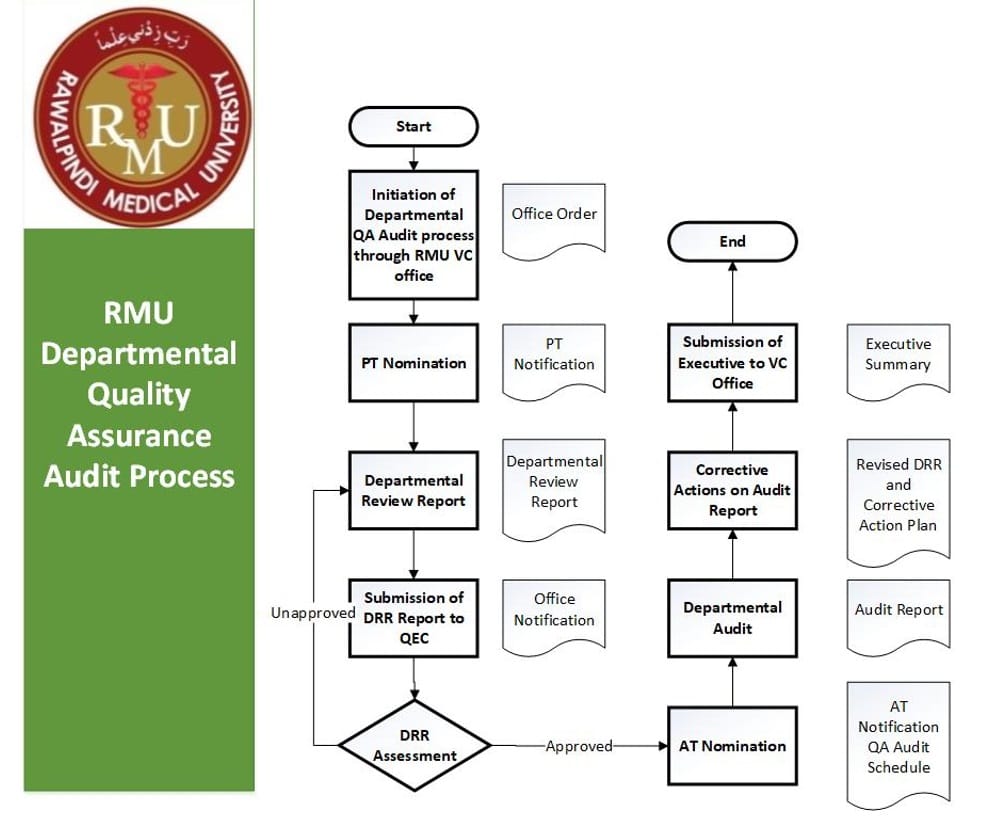
QEC Annual ReportS
- Annual Report 2018-19
QEC Manual
Activities
QEC Monitoring MBBS
